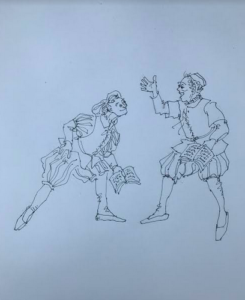
Schoolboys performing colloquies —drawing by John Lithgow
I know, I know—the “whining school-boy…creeping like snail unwillingly to school” and all that—but I actually think Shakespeare had a lot of fun at Stratford’s Latin Grammar school. Not only that, he shared that fun with his classmates.
For one thing, I am absolutely convinced that the first draft of his The Taming of the Shrew was based on a riotously funny collaboration written and performed by Stratford schoolboys, but I’ll save that for a another post when I can show a reading of Erasmus’s hilarious colloquy “Uxor” (Marriage), starring Xanthippe, the Shrew. (My gut tells me that young Will played that part and relished it!)
But I also think that learning dozens and dozens of rhetorical figures and devices was fun too. Why? Well, when you think about it, they ARE fun in themselves—like intricate word puzzles—and wordplay was a major source of entertainment back then. Either by good pedagogy or by necessity, collaboration was a constant factor in the Elizabethan classroom, and figuring out those devices together must have been totally engaging.
Just to demonstrate: I’ve attached here the full video of a presentation I did recently at the studio of Susan Cambique Tracey in which the participants, many of them colleagues and Music Center teaching artists, engaged in a collaborative activity creating examples of four figures. (I’ve posted segments of the video featuring readings from two colloquies—and hope to have one soon of “Uxor”— but the rhetoric portion of the video is in the first half.)
(Video filmed by Scott Powell at the studio of Paul Susan Cambique Tracey)
I’ve been told that some of my blog posts are “erudite.” I hate hearing that. Honestly, I am no scholar. All the years of research I’ve done on this project have been fueled by pleasure and passion: the same qualities that the performing arts bring to the education of children. I hope the laughter and delight experienced by the participants in this video bolsters my theory that arts education, in addition to developing cognition, is a solution to the doldrums our children are experiencing in the contemporary classroom.
Thank you for sharing your knowledge. I can’t believe I didn’t know this about Erasmus. I am anxiously waiting for you to publish your book.
Thank you for your comment Liza. I didn’t know anything about Erasmus’ impact on education either until I discovered the colloquies. Then I got fascinated. Erasmus is mostly known for the dark story of his struggle with Martin Luther leading up to the Reformation, but there’s a much lighter side to his history. He was really a funny guy!
Are you an English teacher now?
I never cease to learn something when I spend time with you. Your passion and joy of learning is fun to experience. You are very special. I wish you luck on your journey.